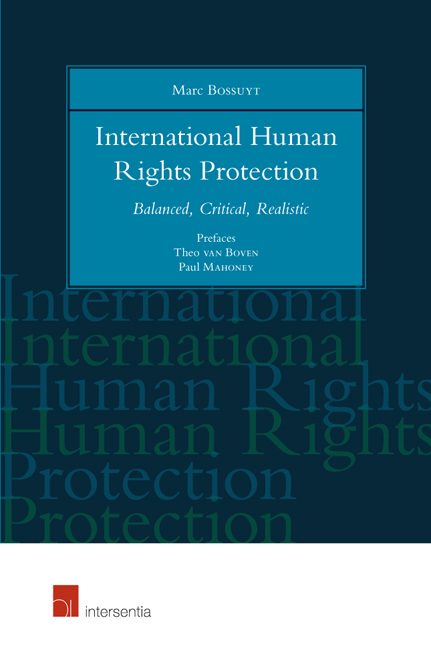Book contents
- Frontmatter
- Dedication
- Preface: A Lifetime of Fidelity and Participation
- Preface: A Penetrating and Salutary Analysis of the European System of Human Rights Protection
- Introduction
- Contents
- Epigraph
- PART ONE International Protection of Human Rights in General
- PART TWO Specific Human Rights Protection
- A Some Specific Human Rights Issues
- B Some Specific Human Rights Regimes
- Chapter XIII The Protection of Refugees in International Law
- Chapter XIV The Protection of Minorities in International Law
- Chapter XV The Protection of Victims of Armed Conflicts
- Annex: At the Crossroads of Law and Politics
- Bibliographies
- About the Author
Chapter XIV - The Protection of Minorities in International Law
from B - Some Specific Human Rights Regimes
Published online by Cambridge University Press: 25 September 2018
- Frontmatter
- Dedication
- Preface: A Lifetime of Fidelity and Participation
- Preface: A Penetrating and Salutary Analysis of the European System of Human Rights Protection
- Introduction
- Contents
- Epigraph
- PART ONE International Protection of Human Rights in General
- PART TWO Specific Human Rights Protection
- A Some Specific Human Rights Issues
- B Some Specific Human Rights Regimes
- Chapter XIII The Protection of Refugees in International Law
- Chapter XIV The Protection of Minorities in International Law
- Chapter XV The Protection of Victims of Armed Conflicts
- Annex: At the Crossroads of Law and Politics
- Bibliographies
- About the Author
Summary
In the absence of a definition of the concept of minority, the protection of minorities, while presenting some links with the protection of human rights, hardly surpasses the prohibition of discrimination of persons on the ground of their belonging to a minority. Despite several attempts, it has not been possible, neither in the framework of the United Nations, nor in the framework of the Council of Europe, to formulate in a legally binding instrument a definition of that concept.
A. THE CONCEPT OF MINORITY IN THE FRAMEWORK OF THE UNITED NATIONS
Article 27 of the International Covenant on Civil and Political Rights (1966) reads as follows:
“In States in which ethnic, religious or linguistic minorities exist, persons belonging to such minorities shall not be denied the right, in community with the other members of their group, to enjoy their own culture, to profess and practise their own religion, or to use their own language”.
However, neither that Covenant nor Article 14 of the European Convention on Human Rights (1950) contain a definition of the concept of “minority”.
It is only in 1979 that in the framework of the United Nations a first attempt to define that concept was undertaken by Professor Francesco Capotorti (Italy), Special Rapporteur of the Sub-Commission on the Prevention of Discrimination and on the Protection of Minorities, in his report on minorities:365
“A group numerically inferior to the rest of the population of a State, in a nondominant position, whose members – being nationals of the State – possess ethnic, religious or linguistic characteristics differing from those of the rest of the population and show, if only implicitly, a sense of solidarity, directed towards preserving their culture, traditions, religion or language.”
From 1980 to 1984, the study of a draft declaration on the right of minorities was entrusted by the Commission on Human Rights to a Working Group. In its resolution 1984/62 the Commission requested the Sub-Commission to draft a text defining the term “minority”. In 1985 a member of the Sub-Commission, Judge Jules Deschênes (Canada), presented a definition largely analogous to that proposed by Professor Francesco Capotorti:
“A group of citizens of a State, constituting a numerical minority and in a nondominant position in that State, endowed with ethnic, religious, or linguistic characteristics which differ from those of the majority of the population,
- Type
- Chapter
- Information
- International Human Rights ProtectionBalanced, Critical, Realistic, pp. 163 - 170Publisher: IntersentiaPrint publication year: 2016



